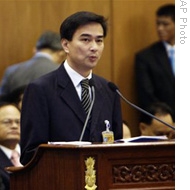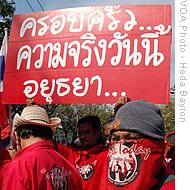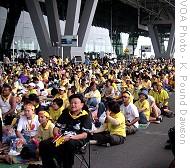voa标准英语2008-Thailand's New Prime Minister Calls for National(在线收听)
 |
| Prime Minister Abhisit Vejjajiva delivers government policy speech at Foreign Ministry in Bangkok, 30 Dec 2008 |
Prime Minister Abhisit Vejjajiva begins his policy speech Tuesday, before going on to say the government will provide additional funds to villages to develop their infrastructure. The new administration plans to spend over $8 billion to stimulate the economy.
The economy, dependent on exports and tourism, is expected to contract because of the global slowdown and domestic political infighting.
Mr. Abhisit's speech, postponed from Monday, was relocated at the last moment to the Foreign Ministry after anti-government protesters refused to end their siege of parliament.
 |
| Supporters of ousted Thai Prime Minister Thaksin Shinawatra protest in Bangkok |
The protesters, who support former Prime Minister Thaksin Shinawatra, consider Mr. Abhisit's two-week-old government illegal. They demand fresh general elections. The pro-Thaksin opposition party boycotted the prime minister's speech Tuesday.
Sirichok Sopha, a member of parliament from Mr. Abhisit's Democrat Party, says the government's main goal is to ease political tensions and revive the economy.
"It's about unity, that's the most important thing, to get the people of Thailand to unite and to understand that Khun [Mr.] Abhisit is the prime minister of every Thai whether it's anti-government or pro-government," said Sirichok. "We will try to deliver our economic stimulus package, telling Thai people what we'll do through this economic crisis."
Mr. Abhisit's coalition came to power after several allies of a pro-Thaksin party split to join with the Democrats.
Chris Baker, a historian and writer about Thai politics, says while the new government will continue to face pressure from Mr. Thaksin's supporters, it is likely to survive into the immediate future.
"Certainly if it can get through this current hurdle and the next few weeks, it will probably survive and hang on to grim death, but it could be there for some time," he said.
 |
| Protesters at main international airport in Bangkok, 26 Nov 2008 |
The country is sharply divided between groups that favor or oppose Mr. Thaksin and his allies. For nearly six months, anti-Thaksin groups held daily protests, ending with an eight-day blockade of Bangkok's airports a few weeks ago. The blockade stranded up to 300,000 tourists and hurt exports, causing hundreds of millions of dollars in economic damage.
Mr. Thaksin, ousted in a coup two years ago, remains popular with the rural poor and urban working class. But the urban middle class and educated accuse him of corruption. He fled Thailand to avoid corruption charges.